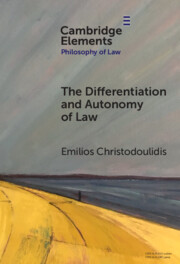Element contents
The Differentiation and Autonomy of Law
Published online by Cambridge University Press: 13 September 2023
Summary
- Type
- Element
- Information
- Series: Elements in Philosophy of LawOnline ISBN: 9781009004619Publisher: Cambridge University PressPrint publication: 05 October 2023
References
- 5
- Cited by

